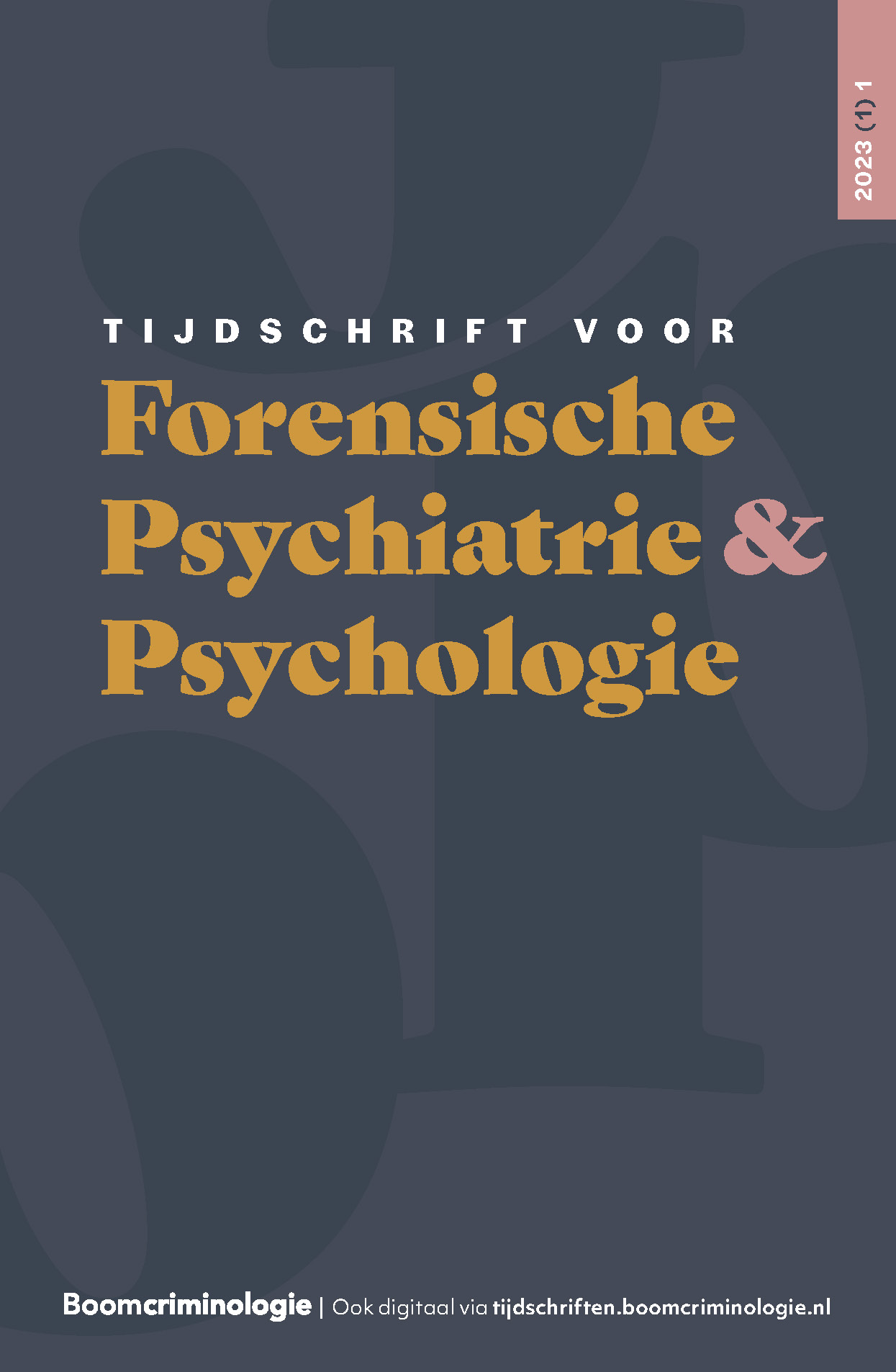|
The Dutch measure of an ‘entrustment order’ (tbs) is the compulsory admittance to a high-secure forensic hospital, aimed at a return to society. Leave is an explicit part of the treatment and rehabilitation, with the aim that the patient applies learned skills in a wider context. The degree of supervision decreases with each new step, while the level of freedom increases. Four types of leave are possible for tbs patients: supervised, unsupervised, extra-institutional and probationary leave. |


Tijdschrift voor Forensische Psychiatrie en Psychologie
Over dit tijdschriftMeld u zich hier aan voor de attendering op dit tijdschrift zodat u direct een mail ontvangt als er een nieuw digitaal nummer is verschenen en u de artikelen online kunt lezen.
| Redactioneel |
|
| Auteurs | Michiel van der Wolf en Vivienne de Vogel |
| Auteursinformatie |
| Wetenschap |
|
| Trefwoorden | verlof tijdens de tbs-maatregel, statische patiëntkenmerken, RNR-model, psychopathie, resocialisatieproces |
| Auteurs | Maartje Clercx, Michiel Verhees en Marije Keulen-de Vos |
| SamenvattingAuteursinformatie |
| Wetenschap |
|
| Trefwoorden | artikel 2.3 Wet forensische zorg, geestelijke gezondheidszorg, psychische problematiek in het strafrecht, juridisch kader, geweldsdelicten |
| Auteurs | Vera Oosterhuis, Andreas Burger, Michiel van der Wolf e.a. |
| SamenvattingAuteursinformatie |
|
The enactment of article 2.3 of the Dutch Forensic Care Act allows criminal courts to issue a care authorization (CA) for compulsory care within the regular mental health care system. Before the enactment, scholars and professionals already stated their worries in the literature. The security levels of regular mental health care facilities would be insufficient and the treatment would lack forensic focus, while persons who would enter through this new article might suffer from complex disorders and/or exhibit violent behavior. |
| Wetenschap |
|
| Trefwoorden | forensische psychiatrie, risicotaxatie, risicocommunicatie, geweldsrecidive |
| Auteurs | Ellen van den Broek, Kasia Uzieblo en Vivienne de Vogel |
| SamenvattingAuteursinformatie |
|
Within the legal, judicial and forensic field risk assessments play an important role. The reliability and validity of commonly used risk assessment instruments have been well researched. Relatively little is known however about how the outcomes of risk assessments are understood by decision-makers and whether the way of communicating these outcomes affects subsequent risk estimation and decision-making. |
| Praktijk |
|
| Trefwoorden | forensische setting, jeugddelinquentie, neurobiologie, longitudinaal, RCT, middelen (ge/mis)bruik |
| Auteurs | Hans van der Baan, Esther de Ruigh, Arne Popma e.a. |
| SamenvattingAuteursinformatie |
|
Performing research in a forensic setting poses certain challenges, especially when it pertains to complex or sensitive research designs. As a result, studies often end up with small sample sizes which limits reliability and generalizability of the results, and consequently narrows their potential for new insights. This article provides several practical recommendations for successful scientific research in youth forensic settings, organized into five steps: study design, setting up, recruiting participants, collecting data, and rounding off the project and communicating results. These tips help researchers carry out their protocols, collect sufficient amounts of good-quality data, and maintain good relations with the institutions. The recommendations are based on experiences from the Study Consortium for Reattributional E-training Effectiveness and Neuroprediction (SCREEN) study, a longitudinal multi-center project in the juvenile forensic setting in the Netherlands that involved 400+ detained youth. This paper intends to aid researchers in setting up and performing research in different closed youth care settings. |
| Praktijk |
|
| Trefwoorden | seksueel grensoverschrijdend gedrag, ontkenning, Good Lives Model, hervalpreventie, dadertherapie |
| Auteurs | Wouter Wanzeele en Alex Seys |
| SamenvattingAuteursinformatie |
|
Categorical denial of sexual misconduct is a significant problem in mandated offender treatment. Despite evolving therapist attitudes, people who categorically deny offending are still often barred from specialized treatment. The evidence base concerning categorical denial seems to show that denial does not necessarily imply a higher risk of reoffending. We suggest that people who categorically deny do have a right to specialized treatment and the chance to work on (relapse) prevention. In this article, we take a Good Lives Model (GLM) approach to categorical denial, and show that meaningful change is possible in people who categorial deny offending, even if they never change the original denial. We analyze the most important primary goods in their life and hypothesize links with the offense for which they were convicted. By investing in the relevant primary goods and removing obstacles to prosocial fulfillment, we work on the root causes of the alleged misconduct, effectively working on relapse prevention despite continued denial. We use a case example to illustrate the four steps of the GLM in working with people who categorical deny offending. Our approach aims to support other treatment providers in working with this sizable group in the field of sex offender treatment. |
| Verslag |
|
| Auteurs | Eleni Georgaki |
| Auteursinformatie |
| Verslag |
|
| Auteurs | Merijne Groeneweg |
| Auteursinformatie |
| Verslag |
|
| Auteurs | Mieke Breij en Britt van Vliet |
| Auteursinformatie |
| Verschenen |
|
| Auteurs | Tamara De Beuf en Vivienne de Vogel |
| Auteursinformatie |
| Verschenen |
|
| Auteurs | Udo Nabitz, Jurgen Vos en Inge Koomen |
| Auteursinformatie |

 Aflevering 1
Aflevering 1